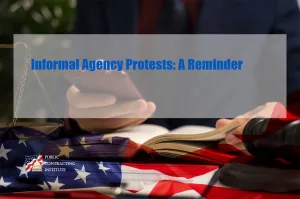Formal agency protests must be submitted in accordance with Federal Acquisition Regulation (“FAR”) 33.103, which sets out specific rules, procedures and requirements. There is a simpler way to protest, the “informal agency protest,” which is governed by the rules established by the Government Accountability Office (“GAO”) and which has only a few specific requirements. In Silver Investments, Inc., B-419208, Oct. 26, 2020, Silver Investments failed to comply and its later protest to the GAO was dismissed.

Here are the requirements for an informal agency protest:
- The letter (or email) must be filed within the time limits prescribed in the GAO Bid Protest rules, unless the agency has a more stringent time for filing.
- The email to the agency does not have to state explicitly that it is a protest, however, it must at least comply with the next two items below
- The email must convey the intent to protest by a specific expression of dissatisfaction with the agency’s actions
- The email must request include a request for relief.
Silver Investments sought to protest the award of a lease issued by the Department of Agriculture for office space, asserting that the awardee’s office space failed to meet the solicitation’s requirements for parking space.
First, the GAO rules require that a protest be filed within 10 days after a protester knew or should have known the basis for the protest. (The GAO rules state that a matter initially protested to the agency will be considered timely if brought to the GAO, provided the agency protest was filed within the GAO protest time limits).
Silver Investments received notice of the award on July 29th. On August 5th, the protester sent an email to various contracting personnel at the Department of Agriculture indicating its concern with the award decision. The email stated that Silver Investments “will be filing an action and naming the people [in the improper award]. The agency advised the protester that its submission did not comply with the bid protest regulations.
The GAO held that Silver’s email on August 5th merely expressed the offeror’s intent to file a protest at a future date, and this weighed against the offeror’s letter as an agency level protest. “A letter that merely expresses a suggestion, hope or expectation does not constitute an agency level protest.” Although the August 5th email expressed dissatisfaction with the agency’s award, it did not request a ruling or any specific relief from the agency, as required y the FAR. Therefore, it was not an agency level protest. Silver’s protest submitted to the GAO on August 20th was more than 10 days after Silver received the award notice. Therefore, GAO dismissed the protest as untimely.
For other helpful suggestions on government contracting, visit:
Richard D. Lieberman’s FAR Consulting & Training at https://www.richarddlieberman.com/, and Mistakes in Government Contracting at https://richarddlieberman.wixsite.com/mistakes.
Copyright 2021 Richard D. Lieberman, Consultant & Retired Attorney
